In a world where sustainability has become a foremost concern, even the smallest choices we make can have a significant impact on the environment.
One such choice lies in the selection of our tableware.
Traditional tableware made from materials like plastic or styrofoam is not only harmful to the environment but also poses risks to human health. However, a promising alternative has emerged in recent years – tableware made from plants.
Today You’ll Know About the Following:
Types of Plant-Based Tablewares:
Areca Palm-Based Tableware:
Areca palm-based tableware stands out as a shining example of eco-friendly elegance. Derived from the fallen leaves of the Areca palm tree, this biodegradable option offers a host of benefits for both consumers and the planet.
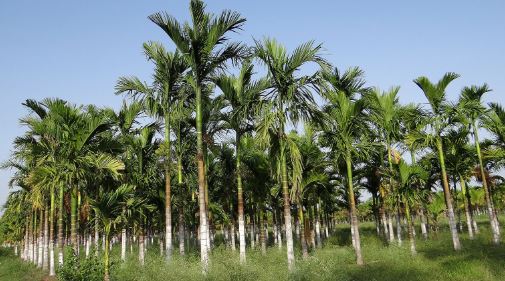
This tableware encompasses a variety of dining essentials, including plates, bowls, trays, and even cutlery.
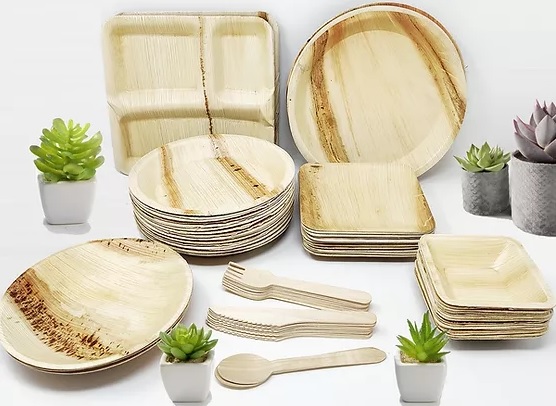
The process of crafting these items begins with collecting fallen Areca palm leaves, which are then cleaned, heat-pressed, and molded into various shapes.
Significant advantages of Areca palm-based tableware:
- They are lightweight, sturdy, and visually appealing tableware products that rival their plastic or paper counterparts.
- Areca palm-based tableware has biodegradability.
- Furthermore, Areca palm-based tableware is free from harmful chemicals and toxins, making it safe for both human health and the environment.
- With its natural textures and earthy tones, Areca palm products add a touch of rustic charm to any dining setting, whether it’s a casual backyard barbecue or an elegant dinner party.
- Moreover, Areca palm tableware is heat-resistant and microwave-safe, making it suitable for a wide range of culinary creations.
- From an economic standpoint, the production of Areca palm-based tableware presents opportunities for sustainable livelihoods and community development.
- In regions where Areca palm trees grow abundantly, the collection and processing of palm leaves can provide income for local communities, contributing to economic empowerment and social welfare.
Bamboo-Based Tableware:
Where environmental concerns are at the forefront of global conversations, one sustainable alternative to everyday products that has been gaining popularity in recent years is bamboo-based tableware. Bamboo, known for its rapid growth and versatility, serves as an excellent material for crafting tableware.
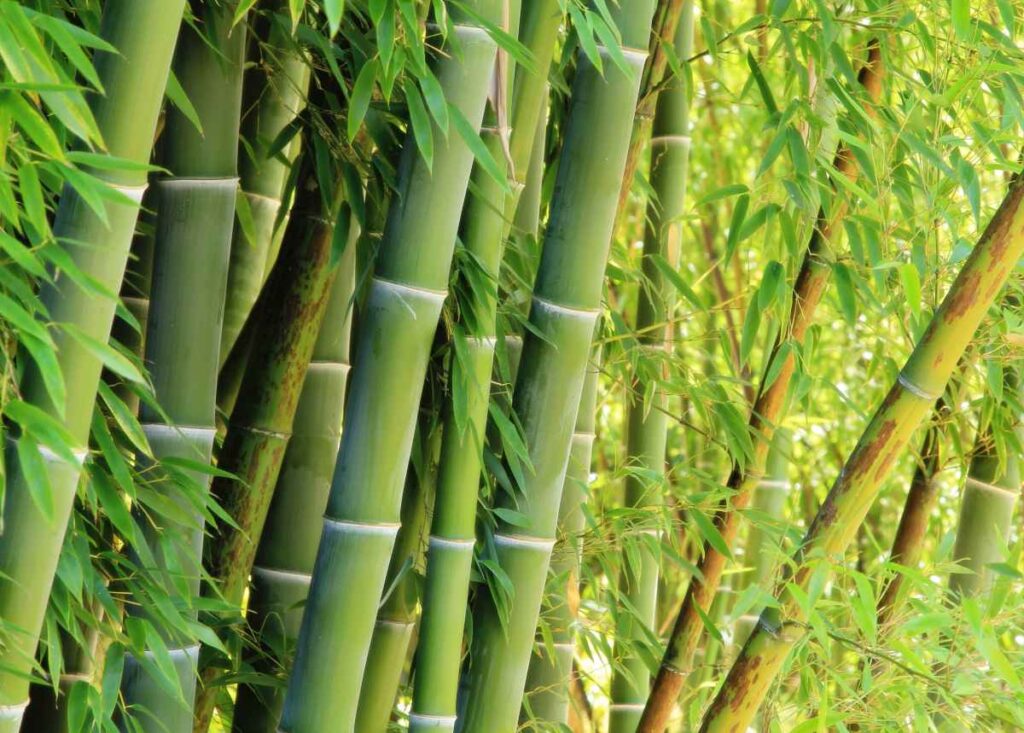
From plates and bowls to utensils and even cups, bamboo-based tableware offers a wide range of options for all dining needs.
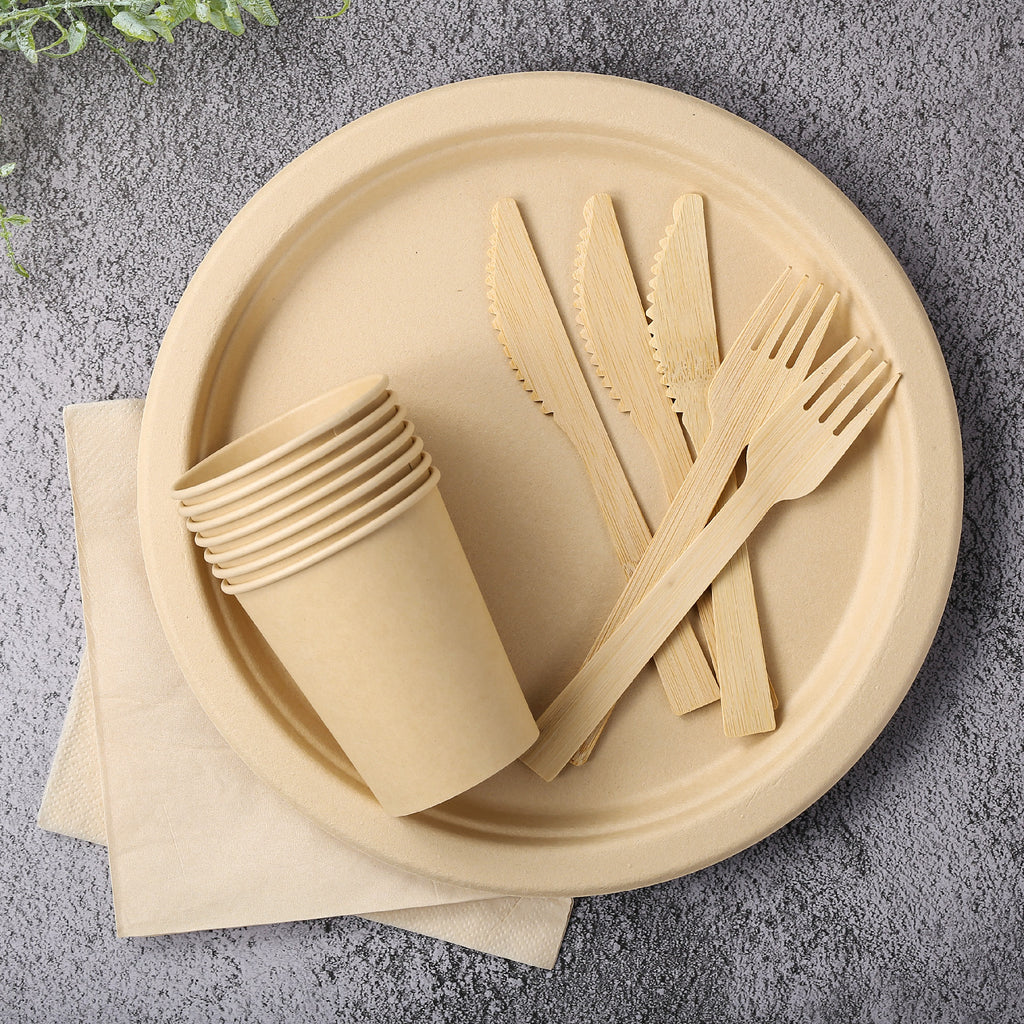
What sets bamboo apart from traditional materials like plastic or ceramic?
- First and foremost, bamboo is a renewable resource.
- Unlike trees, bamboo grows incredibly fast, with some species reaching maturity in as little as three to five years.
- This rapid growth rate makes bamboo highly sustainable.
- Furthermore, bamboo possesses natural antibacterial properties, making it an ideal choice for tableware.
- Additionally, bamboo-based tableware is lightweight yet durable, making it perfect for both indoor and outdoor use.
- As consumer demand for sustainable products continues to rise, businesses that prioritize bamboo-based tableware can tap into a growing market segment and create opportunities for economic growth and job creation.
Sugarcane Bagasse-Based Tableware:
In the ongoing pursuit of eco-friendly alternatives, sugarcane bagasse-based tableware emerges as a sustainable solution that not only minimizes waste but also offers practicality and elegance. Derived from the fibrous residue left behind after sugarcane is processed for juice extraction, sugarcane bagasse provides a renewable and biodegradable material for crafting a variety of dining essentials.
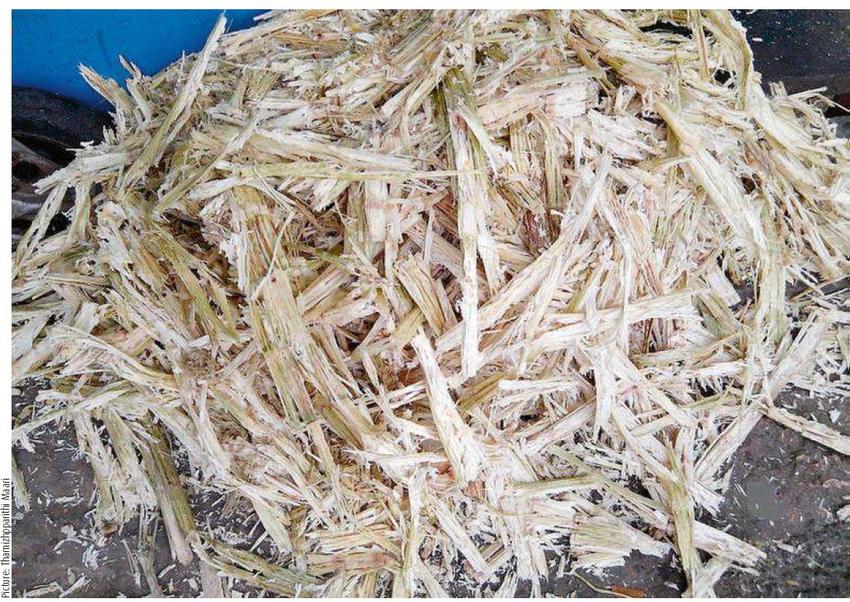
Sugarcane bagasse-based tableware encompasses a wide range of products, including plates, bowls, cups, and takeout containers. The production process begins with collecting the leftover sugarcane fibers, which are then pulped, molded, and dried to form sturdy and lightweight tableware items.
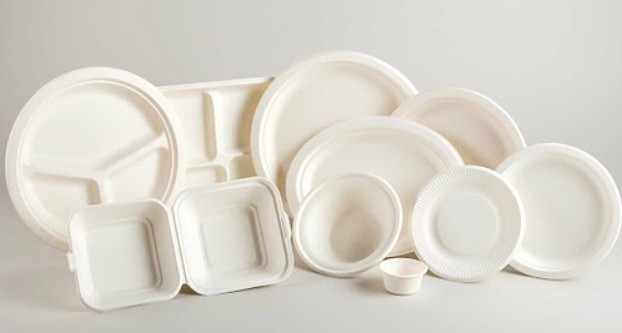
The key benefits of sugarcane bagasse-based tableware:
- Unlike traditional materials such as plastic or polystyrene foam, sugarcane bagasse is biodegradable and compostable.
- Moreover, sugarcane bagasse-based tableware offers a sustainable alternative to virgin paper products.
- By utilizing a byproduct of the sugarcane industry, this eco-friendly option helps conserve natural resources and reduce carbon emissions, making it a win-win for both consumers and the environment.
- These products are microwave-safe, freezer-safe, and oil-resistant, making them suitable for a wide range of culinary applications.
- From an economic perspective, the production of sugarcane bagasse-based tableware supports sustainable livelihoods and local economies.
Banana-Based Tableware:
As eco-friendly alternatives, banana-based tableware emerges as a unique solution that harnesses the versatility of this tropical fruit to create functional and stylish dining accessories. Derived from the discarded parts of the banana plant, such as stems and leaves, banana-based tableware offers a renewable and biodegradable alternative to traditional materials like plastic and paper.
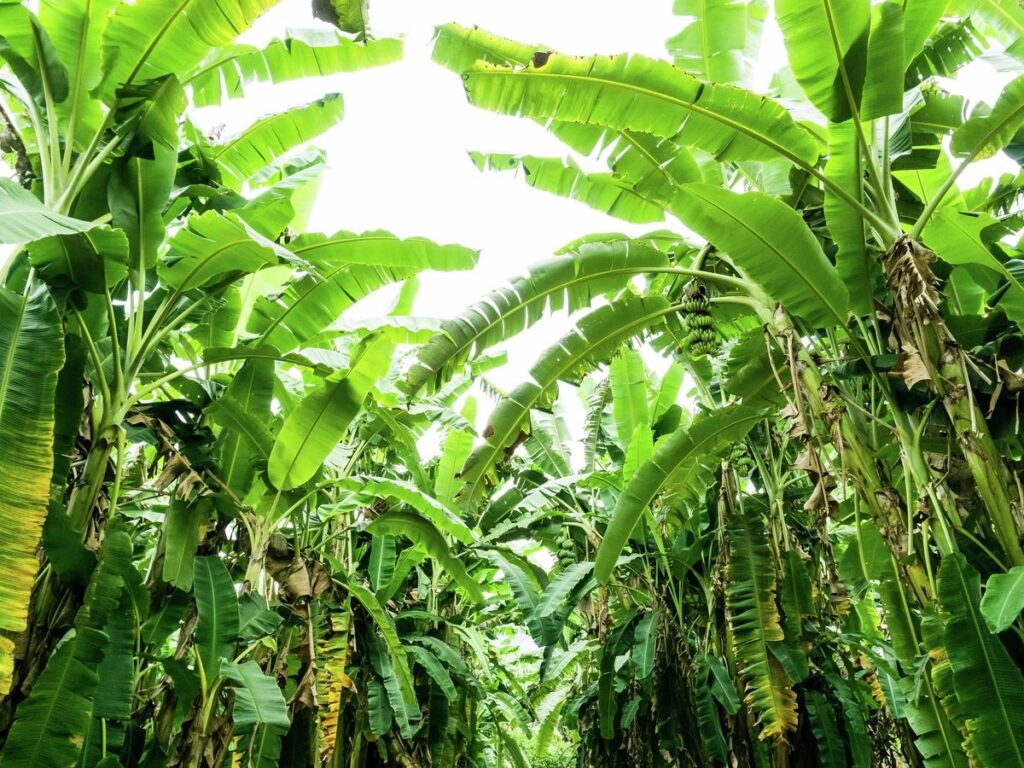
Banana-based tableware encompasses a diverse range of products, including plates, bowls, trays, and utensils. The production process begins by collecting the fibrous residues left behind after harvesting bananas. These residues are then processed, molded, and dried to create tableware items that are both functional and aesthetically pleasing.
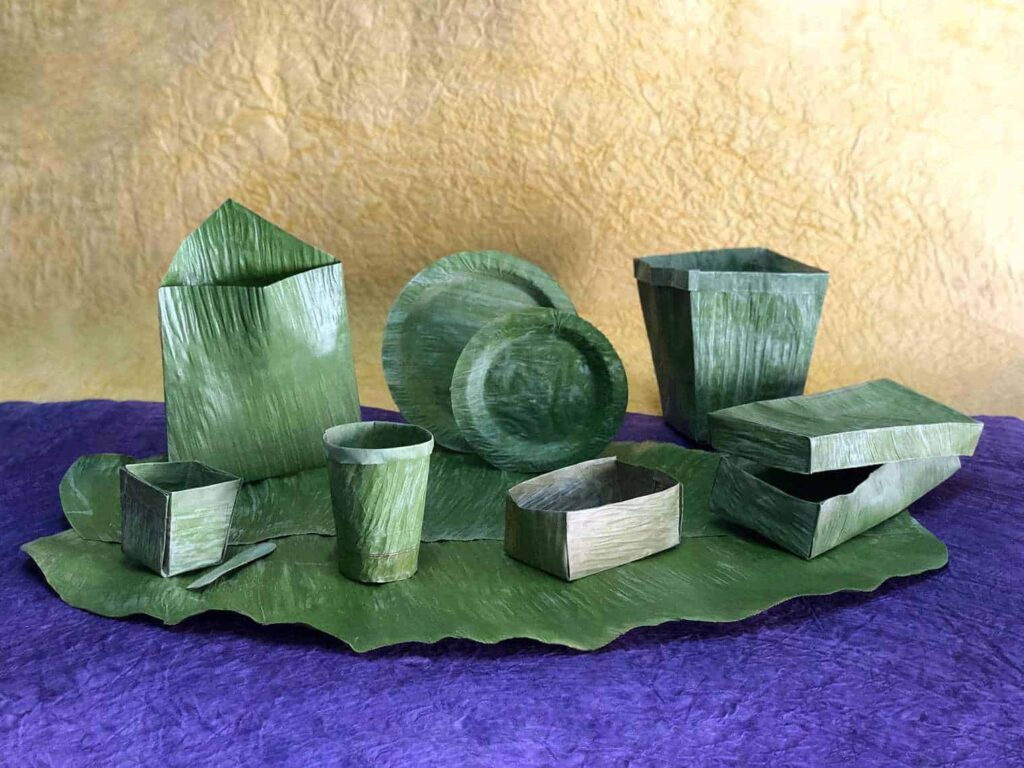
The merits of banana-based tableware:
- One of the key benefits of banana-based tableware is its sustainability.
- By repurposing banana plant residues, this eco-friendly option helps reduce waste and minimize environmental impact, making it a sustainable choice for conscious consumers.
- Moreover, banana-based tableware offers biodegradability and compostability, ensuring that these products can return to the earth at the end of their lifecycle without leaving behind harmful residues.
- These products are durable, heat-resistant, and suitable for a wide range of culinary applications.
- By creating demand for banana plant residues, this industry incentivizes farmers to adopt more sustainable agricultural practices, leading to improved soil health and increased crop yields.
- Additionally, the manufacturing and distribution of banana-based products generate employment opportunities and stimulate economic growth in regions where banana cultivation is prevalent.
Banyan-Based Tableware:
Banyan-based tableware stands out as an innovative solution and a symbol of eco-consciousness and resourcefulness. Derived from the leaves and bark of the majestic banyan tree, this eco-friendly alternative offers both practical functionality and aesthetic appeal, while also contributing to environmental preservation.

Banyan-based tableware encompasses a diverse array of products, including plates, bowls, cups, and utensils. The production process begins with responsibly sourcing the leaves and bark of the banyan tree, ensuring that no harm is done to the tree itself. These natural materials are then cleaned, treated, and molded into various shapes to create durable and biodegradable tableware items.
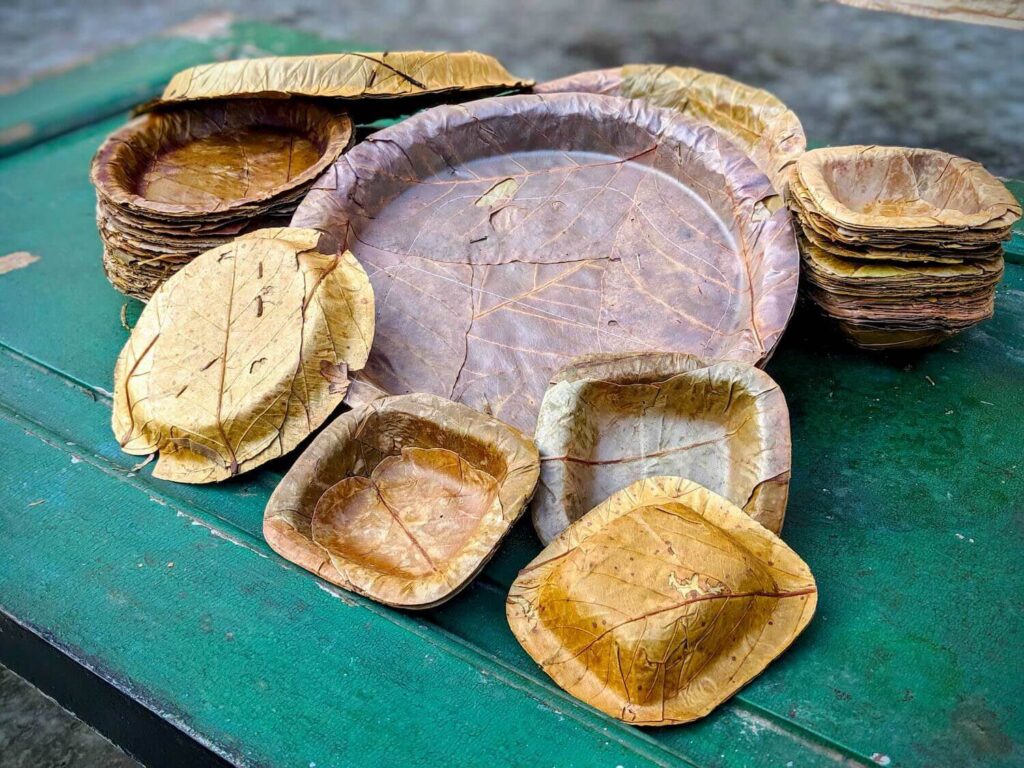
The primary advantages of banyan-based tableware:
- The banyan tree, revered for its strength and longevity, provides a renewable and abundant source of raw materials.
- By utilizing parts of the tree that would otherwise go to waste, banyan-based tableware minimizes environmental impact and reduces the need for more resource-intensive alternatives, such as plastic or paper.
- Moreover, banyan-based tableware offers inherent biodegradability, ensuring that these products can return to the earth without contributing to landfill pollution.
- These products are lightweight yet sturdy, making them suitable for a wide range of dining occasions, from casual picnics to elegant dinner parties.
- Banyan-based tableware is also heat-resistant and microwave-safe, providing convenience and versatility for everyday use.
- Moreover, the widespread adoption of banyan-based tableware has the potential to promote economic prosperity and preserve the natural heritage of the banyan tree for generations to come.
Why Should You Pick Them?
Environmental Sustainability:
Plant-based tablewares are biodegradable and compostable, reducing the burden on landfills and oceans. They help minimize the environmental impact of disposable products and contribute to a more sustainable future.
Renewable Resources:
Unlike plastic or styrofoam, which are derived from non-renewable fossil fuels, plant-based tablewares are made from renewable resources such as bamboo, sugarcane, or cornstarch. This reduces dependence on finite resources and promotes a circular economy.
Health Benefits:
Plant-based tableware is free from harmful chemicals such as BPA and phthalates, which are commonly found in plastic products. Using plant-based tableware reduces the risk of chemicals leaching into food and beverages, promoting safer and healthier dining experiences.
Aesthetic Appeal:
Many plant-based tableware products feature natural textures and earthy tones, adding a touch of rustic charm to dining experiences. They are ideal for eco-conscious consumers who value both style and sustainability.
Are They Recommendable to Non-Users?
Absolutely.
- Plant-based tablewares offer a practical and eco-friendly alternative to conventional disposable products.
- By choosing plant-based tableware, individuals can align their purchasing decisions with their values and contribute to positive environmental change.
- Additionally, the growing availability and affordability of plant-based tableware make it an accessible option for consumers across various demographics.
Impacts of Eco-Friendly Plant-Based Tablewares on the Economic System:
The adoption of plant-based tableware has the potential to drive positive economic outcomes at multiple levels:
- Market Growth:
- The rising demand for sustainable products, including plant-based tableware, stimulates market growth and innovation within the eco-friendly industry.
- This creates opportunities for businesses to develop new products, expand their customer base, and generate revenue.
- Job Creation:
- The production and distribution of plant-based tableware require a workforce skilled in manufacturing, logistics, and marketing.
- As the market for sustainable products grows, so does the demand for skilled labor, leading to job creation and economic prosperity.
- Cost Savings:
- While plant-based tableware may initially have a higher upfront cost compared to traditional disposable products, it offers long-term cost savings by reducing waste management expenses and potential environmental liabilities.
- Businesses that embrace sustainable practices can enhance their bottom line while minimizing their ecological footprint.
- Brand Reputation:
- Embracing plant-based tableware can enhance a company’s brand reputation by demonstrating a commitment to environmental stewardship and corporate social responsibility.
- Consumers are increasingly drawn to brands that prioritize sustainability, leading to greater brand loyalty and market competitiveness.
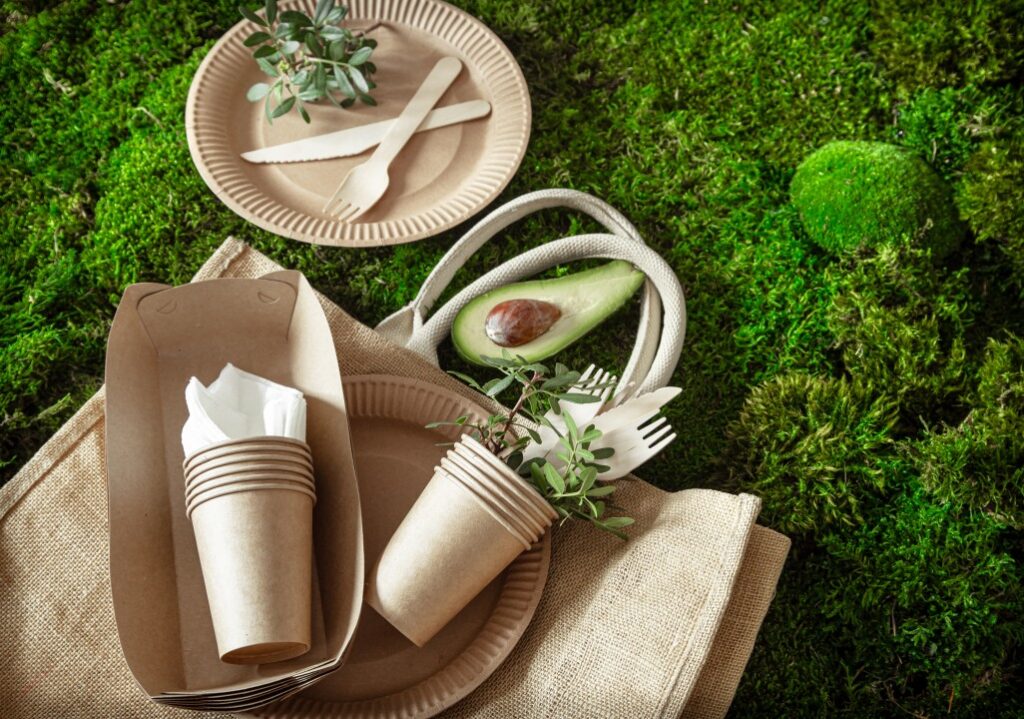
The adoption of plant-based tableware represents a significant step towards building a more sustainable and resilient future.
By choosing eco-friendly alternatives, you can make a positive impact on the environment, support economic growth, and inspire others to embrace sustainable living practices.
Together, we can create a greener and more prosperous world for generations to come.



MOST COMMENTED
Animal-Based Proteins / Casein Protein / Dietary Protein / High-Protein Diets / Pea Protein / Plant-Based Proteins / Protein / Protein Deficiency / Protein Supplements / Proteins / Whey Protein / Whey Proteins
Is Protein Powder Safe for Teenagers and Children?
Animal-Based Proteins / Casein Protein / Dietary Protein / High-Protein Diets / Pea Protein / Plant-Based Proteins / Protein / Protein Deficiency / Protein Supplements / Proteins / Whey Protein / Whey Proteins
Unlock the Power of Proteins for Optimal Gut Health
Multivitamin
Total Health: Multivitamin for Active Lifestyles
Multivitamin
WellnessFusion: Complete Multivitamin Support
Dietary Supplement
Revitalize Your Health: The Magic of Red Yeast Rice Capsules
Foot care / Foot Health
Revitalize Your Foot Care Routine: Essential Tips for Optimal Foot Health
Foot Problem / Diabetics / Foot Health
Diabetics: Mastering Footwear Selection for Enhanced Foot Health and Ultimate Comfort
Exercises and Footwear Tips for Hammertoe Relief / Foot care / Foot Health / Foot Pain / Foot Problem / Hammertoes
Unlock Effective Exercises and Footwear Tips for Hammertoe Relief
Hammertoes / Foot Health / Foot Pain / Foot Problem
Unlock Relief: Essential Guide to Hammertoes Causes, Symptoms, and Treatments
Foot Problem / Foot Health
Revolutionize Your Recovery: Natural Remedies for Plantar Fasciitis – Fresh Home Keepers